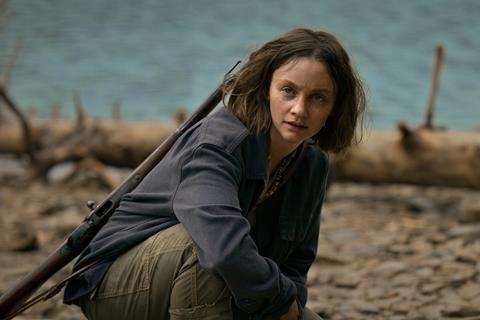A child threatens the security of an isolated village in this atmospheric feature debut from Swiss director Sophia Bosch

Dir: Sophia Bosch. Germany/Switzerland. 2024. 97mins
The accomplished, atmospheric feature debut from Sophia Bosch, Milk Teeth is an uneasy enigma of a movie that hints at both pagan paranoia and post-apocalyptic uncertainty in its isolated village setting. Bosch prefers not to overtly spell out the wider circumstances that have led the fierce insularity within this community, and the consequences of admitting strangers, but the lurking mystery beyond the forests only adds to the picture’s disquieting potency.
The lurking mystery only adds to the picture’s disquieting potency
Swiss director Bosch loosely adapted this screenplay (along with co-writer and regular collaborator Roman Gielke) from Helene Bukowski’s 2021 novel of the same title about an outsider – as a consequence of her parentage – named Skalde (the excellent Mathilde Bundschuh) who has worked tirelessly to earn the trust of her tight-knit, wary community but risks it all when she takes pity on a child.
Tonally, there are some similarities here with the uncanny, oppressive world-building in the work of Lucile Hadzihalilovic, and thematically – dealing as it does with the question of nurture against the backdrop of what may or may not be the end of the world – there is a kinship with Mahalia Belo’s The End We Start From. A healthy festival run seems likely, and Milk Teeth could find a home with an adventurous arthouse distributor or streaming platform.
Protected by dense forest and a wide river, the villagers patrol the perimeter of their lands with rifles, ever vigilant against the threats hinted at by mutilated animal corpses and the burning birds that sporadically plummet from the sky. But then Skalde breaks the rules, bringing home a girl (Viola Hinz) she finds wandering in the forest and giving her shelter. Skalde’s hard-earned status is lost and, in its place, a mounting hostility and sense of threat.
Central to the film’s success is the casting. Bosch and her team have a keen eye for the kind of faces that can seem utterly benign and then, with the subtlest shift in camera angle, be suffused with menace.
Ulrich Matthes, cast as the community elder, is supremely chilling, for example, his reasonable, conciliatory tone at odds with his bullet-eyed gaze and the draconian punishments that he orders (infractions from the strict community codes result in a warning, emphatically delivered with a hammer to the left hand). And the child, Meisis, with her unsmiling countenance and unnerving feral quality, could simply be a traumatised girl who has lost everyone and everything. But then there is the fact that she seems to be able to talk to the village dogs – a skill that doesn’t sit easily with villagers who already spend a great deal of time muttering about curses, witchcraft and – most of all – wolf children.
With the support of her elderly female neighbour, Skalde brokers a deal with the villagers. The child will be allowed to stay until she loses her milk teeth –failure to shed them will indicate that she is a wolf in disguise. But the tensions are high in the village. The animosity towards Skalde is extended to her mother Edith (Susanne Wolff), a fellow outsider who bears the scars of the ritual corrective punishment on her ruined left hand.
The still air seems to be weighted ominously; even the bird calls in the woodland take on a menacing quality – with minimal use of music, the soundscape creates much of the film’s tension. Bosch may not explain what or where the danger is, but we never doubt that it is real. Soon, Skalde starts to realise that she and the child have no future in the village, that belonging is a privilege that can be withdrawn on a whim.
Production company: Weydemann Bros. GmbH
International sales: Level K alexandra@levelk.dk
Producer: Milena Klemke
Screenplay: Sophia Bösch, Roman Gielke
Cinematography: Aleksandra Medianikova
Editing: Andrea Muñoz
Production design: Mona Cathleen Otterbach
Music: Rahel Zimmermann, Moritz Widrig
Main Cast: Mathilde Bundschuh, Susanne Wolff, Ulrich Matthes, Viola Hinz, Lola Dockhorn
























